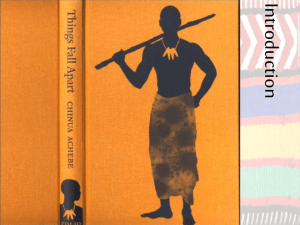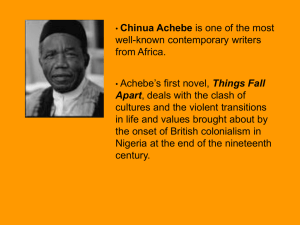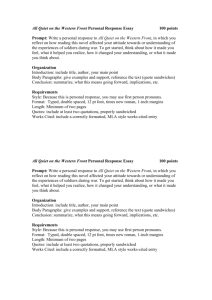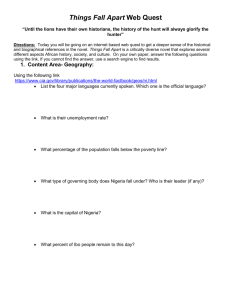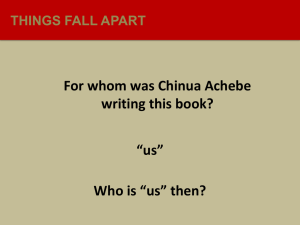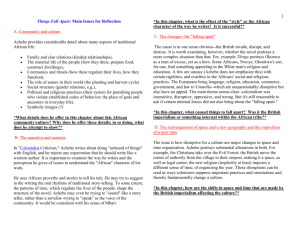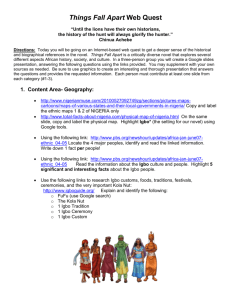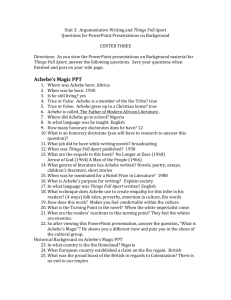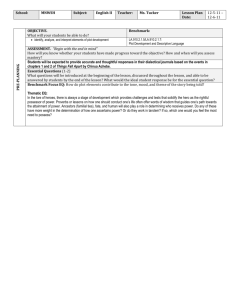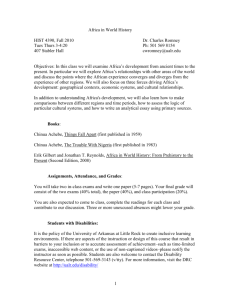Things Fall Apart Activity Two.doc
advertisement
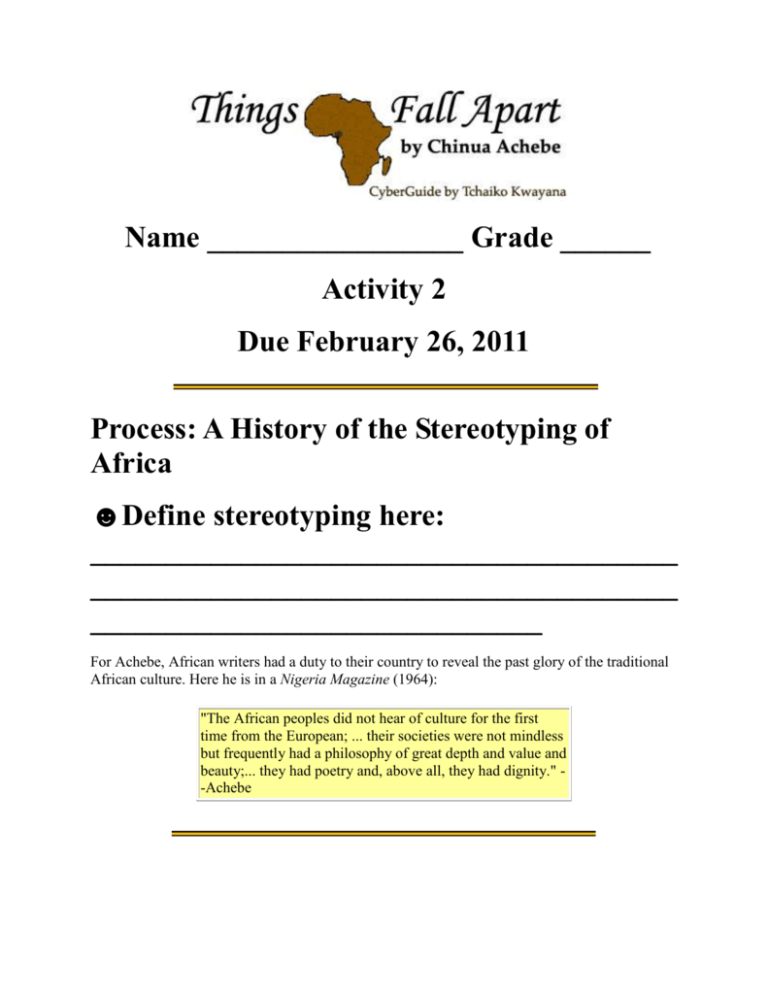
Name _________________ Grade ______ Activity 2 Due February 26, 2011 Process: A History of the Stereotyping of Africa ☻Define stereotyping here: _______________________________________ _______________________________________ ______________________________ For Achebe, African writers had a duty to their country to reveal the past glory of the traditional African culture. Here he is in a Nigeria Magazine (1964): "The African peoples did not hear of culture for the first time from the European; ... their societies were not mindless but frequently had a philosophy of great depth and value and beauty;... they had poetry and, above all, they had dignity." -Achebe Introduction In Activity 1, you were introduced to Achebe's Africa. You compared political boundaries. Such changes would not be new to you. Europe's political boundaries have changed many times just over the last one hundred years. Recently, the Balkans' boundaries changed. The political changes in the boundaries of the country now known as Iraq have not let the world ignore the decisions of colonial powers. Rwanda and Burundi, India and Pakistan, Nigeria itself. People have been separated from their own families by colonial boundaries. Many of the 20th and 21st Century's world conflicts have their genesis in these decisions. Name such an incident as mentioned in the sentence above. ____________________________________ You also explored Cultural aspects of Africa. The word culture was shown with a big C to show that, unlike European societies, all aspects of traditional African life were linked. You read of the important philosophical beliefs of various African cultures. You also read differences between African religious concepts and those of European Christianity. You now have read Achebe's Things Fall Apart, a novel published in London in 1958. Before you can truly begin to understand the novel, you will need some background information on the writer, Chinua Achebe, just as you have begun receiving on the continent of his birth, Africa. Interconnected with this discovery of a noted author, your continued task in Activity 2 is to understand the colonization of Africa. It is that colonization and the effects of that era that gave Achebe the incentive to write his classic. Your task in Part 1 is to examine the doctrine and practices of Colonialism and Imperialism. In Part 2 you will have many opportunities to analyze discussions by and about Chinua Achebe; you should gather what it is that he so wants the world to realize about Africa that is different from the Western portrayal. Think about these questions as you read. What is that western portrayal? When did such stereotyping begin? Why? Specifically what experiences led Achebe to write Things to Fall Apart? At the conclusion of this research, you will write an essay agreeing or disagreeing with Achebe's argument. Part 1: Africa in the Context of Colonialism and Modern World Imperialism "Here is an adequate revolution for me to espouse--to help my society regain belief in itself and put away the complexes of the years of denigration and self-abasement. And it is essentially a question of education, in the best sense of the word." --Achebe (Achebe's Fiction and Contemporary Nigerian Politics) ☻What is Achebe's solution to the problems created by colonialism? TASK ☻ Research the topic of imperialism and colonialism you will keep very careful notes with citations in your Things Fall Apart journal. You are expected to respond in your journal to the challenges of the various links. Imperialism: Stealing Nikki's Purse To understand how history can be distorted, read the account, an analogy, written by a teacher Bill Bigelow, Go to the WEB and Find Stealing Nikki's Purse. Do not print just read it!!!!! ☻Then write your understanding of what you have read in your TFA journal. must be a paragraph long, no less than 10 sentences. Your response To understand the modern colonial and imperial eras, it is very important to understand the role of the British and why the "sun never set" on her empire. Note: Until 1998 when Hong Kong reverted to Chinese rule, it was a truth that in modern time, "the sun never set on the British Empire." The "White Man's Burden" Using one of the close reading strategies; read Rudyard Kipling's "White Man's Burden". ☻Then interpret it in your own words; make your response in your journal: www.wsu.edu/~wldciv/world_civ_reader/.../kipling.html The Atlantic Slave Trade ☻Explore www.mrdowling.com/610colafr.html and take notes on Maafa pay close attention to the map and who had control of Africa at the time. Cite this page at the end of your notes. How to cite it is at the end of the web page. There is a word that can loosely be translated as "holocaust" in Kiswahili. The word, "Maafa" is widely used by African Americans to describe the fact of slavers and slavery. Maafa gives a wealth of information about the carving up of Africa and the slave trade and colonialism that took place over centuries. The Scramble for Africa For all of the following use this heading "A Changing Africa". In Activity 1, you printed a map of Africa in the context of the World. The map of Africa has ☻View your colonial map and a modern map of Africa today Note 3 changes that have occurred in your journal. ☻Question those changes. Why the word, gone through radical changes. "scramble"? It is very important that you understand what happened at the Berlin Conference of 1884-85, the beginning of formal colonialism. It was here that European nations, around a table in Berlin, carved out territories that they claimed as their own, just as Europeans had "discovered" America and carved it out in their own image. (Some historians, for example, view Columbus in the same way as Achebe views the Europeans who "discovered" and divided Africa during the Berlin Conference. You may find it difficult to find many discussions about the very important 1884-85 Berlin Conference on the Internet. ☻Go to the Colonial map (Mr Dowling's Electronic Passport) and list the European countries that took possession of specific African areas in the area of your choice (N, S, E, W, or Central). Answer these questions: What connections can you make between this "scramble" and United States history? How were decisions made as to how Africa would be divided? Where were those decisions made? ☻Read the reviews at www.completereview.com/reviews/hochscha/kingleo.htm of King Leopold's Ghost. ☻After you have read the reviews answer these questions in your journal. What were the atrocities? What were Belgium's gains? What were Africa's losses? Achebe was born in Colonial Africa, in an area that would be named Nigeria. Which peoples (3 groups) were forced together as a part of this creation? About how many ethnic groups were forced together? Answer in your journal. Use the linked map: http://kids.mapzones.com/world/nigeria/
